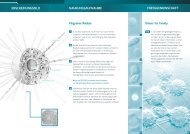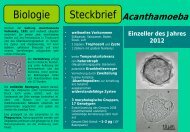Paramecium - Deutsche Gesellschaft für Protozoologie / German ...
Paramecium - Deutsche Gesellschaft für Protozoologie / German ...
Paramecium - Deutsche Gesellschaft für Protozoologie / German ...
You also want an ePaper? Increase the reach of your titles
YUMPU automatically turns print PDFs into web optimized ePapers that Google loves.
In situ diversity of marine heterotrophic flagellates<br />
Ramon Massana<br />
Institut de Ciències del Mar, CSIC. Barcelona, Spain<br />
Heterotrophic flagellates are ubiquitous protists that play key roles in<br />
planktonic marine food webs. They are the main consumers of prokaryotes<br />
and participate directly in nutrient remineralization. Both<br />
direct measurements and size-fractionation grazing experiments have<br />
revealed that these assemblages are numerically dominated by very<br />
small cells of 2-3 µm in diameter, which mostly remain unidentified.<br />
Recent molecular surveys of marine picoeukaryotes have revealed a<br />
huge diversity and the presence of novel lineages. Here I will show<br />
that some of these novel lineages, in particular some organisms forming<br />
novel clades within the stramenopile radiation (MAST, Marine<br />
Stramenopiles), account for a significant part of heterotrophic flagellates<br />
assemblages. Phylogenetic probes against different MAST<br />
groups have been designed and optimized for FISH to follow the<br />
abundance and distribution in the environment of the corresponding<br />
organisms. These probes can be further applied in experiments to<br />
infer the growth and grazing rates of these still uncultured flagellates.<br />
Tools to open the black box of marine heterotrophic flagellates,<br />
which are composed of diverse groups with diverse functions, start to<br />
be available.<br />
ramonm@icm.csic.es<br />
14





